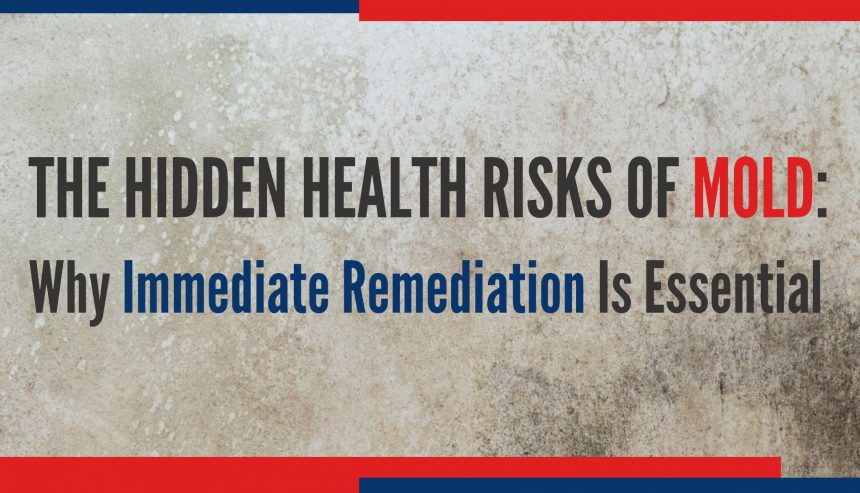The Hidden Risks of Mold: Why Immediate Remediation Is Essential
Mold is more than just an unsightly problem in homes and businesses—it poses serious health risks that can affect anyone, especially those with preexisting conditions. Mold thrives in damp, humid environments, making Florida homes particularly vulnerable. If left unchecked, mold can lead to a wide range of problems that impact respiratory function, skin problems, and overall well-being.
Common Health Issues Caused by Mold Exposure
1. Respiratory Problems
One of the most common health effects of mold exposure is respiratory distress. Mold spores are airborne and can be inhaled, leading to:
- Persistent coughing and wheezing
- Shortness of breath
- Nasal congestion and sinus infections
- Asthma flare-ups
Individuals with asthma or chronic lung conditions may experience more severe reactions, making mold remediation a necessity rather than an option.
2. Allergic Reactions
Mold is a powerful allergen. Even in individuals without previous allergies, exposure can trigger:
- Sneezing
- Runny or stuffy nose
- Itchy, watery eyes
- Skin rashes
For those with heightened sensitivities, prolonged mold exposure can lead to chronic allergic symptoms and worsening health over time.
3. Skin Irritation and Rashes
Direct contact with mold or mold-infested surfaces can cause skin irritation. Some individuals may experience redness, itching, and even dermatitis due to exposure. This is especially concerning for children and individuals with sensitive skin.
4. Neurological Symptoms
Recent studies suggest that exposure to toxic mold can have neurological effects, including:
- Headaches and migraines
- Memory problems or brain fog
- Dizziness
- Fatigue
Prolonged exposure can affect cognitive function and daily performance, making mold removal critical for maintaining a healthy living environment.
5. Immune System Suppression
Individuals with weakened immune systems, such as the elderly, infants, or those undergoing medical treatments, are particularly vulnerable to mold-related illnesses. Mold exposure can weaken immune responses, making people more susceptible to infections and other serious health issues.
How can I tell if there is mold in my home – should I test my home for mold?
Indoor mold growth can usually be seen or smelled. In most cases, if visible mold growth is present, sampling is not needed. There are no exposure-based standards that you can use to evaluate a mold sampling result.
The Florida Department of Health does not recommend mold testing or sampling to see if you have a mold problem, or to see what kind of mold might be growing. Sampling for mold in the air can be expensive and, if done, should only be done by experienced professionals.
- Look for visible mold growth (it may look cottony, velvety, rough, or leathery and have different colors like white, gray, brown, black, yellow, or green). Mold often appears as a staining or fuzzy growth on furniture or building materials (walls, ceilings, or anything made of wood or paper). Look for signs of moisture or water damage (water leaks, standing water, water stains, condensation, etc.).
- Check around air handling units (air conditioners, furnaces) for standing water. Routinely inspect the evaporator coils, liner surfaces, drain pans and drain lines.
- Search areas where you notice mold odors. If you can smell an earthy or musty odor, you may have a mold problem.
- If mold-allergic people have some of the symptoms listed above when in your home, you may have a mold problem.
How can I be exposed to mold?
Mold is virtually everywhere, floating in the air and on all surfaces. People are exposed to molds every day. Exposures increase when indoor moldy materials become dried, damaged or disturbed, causing spores and other mold cells to be released into the air and then inhaled.
Elevated exposure can also occur if people directly handle moldy materials or accidentally eat mold.
Why Professional Mold Remediation Is Important
Mold growth often occurs in hidden areas, such as behind walls, under flooring, and inside HVAC systems. Simply wiping away visible mold does not solve the problem—it requires professional intervention to eliminate the source and prevent regrowth.
At PuroClean of Davie, we specialize in comprehensive mold remediation. Our team uses advanced equipment to detect and remove mold safely, ensuring your home or business is free from hazardous spores. We also provide moisture control solutions to prevent future mold issues, helping you maintain a safe and healthy environment.
Call PuroClean of Davie Today!
If you suspect mold in your home or business, don’t wait until health problems arise. Contact PuroClean of Davie for a professional mold inspection and remediation service. Our experienced team is ready to restore your property and safeguard your well-being.




 PuroClean of Davie
PuroClean of Davie